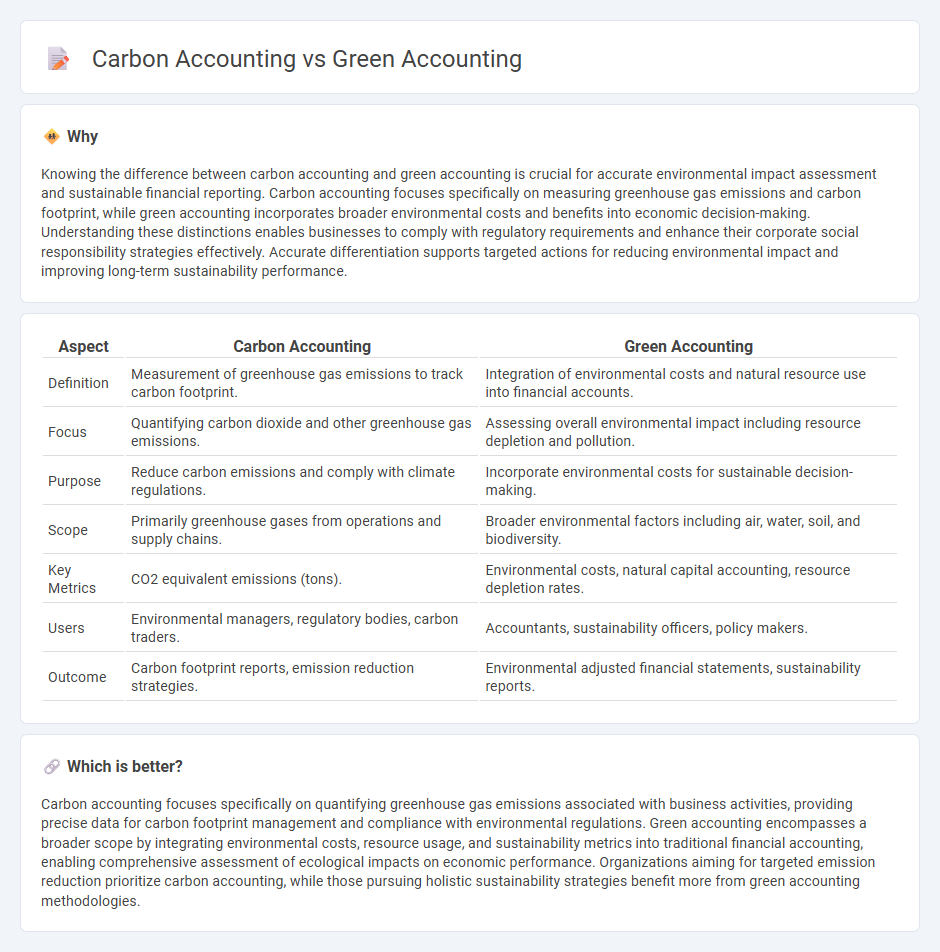
Carbon accounting quantifies greenhouse gas emissions produced by organizations, enabling precise tracking of carbon footprints for environmental compliance and reduction strategies. Green accounting expands beyond carbon metrics to include environmental costs and natural resource use, providing a comprehensive assessment of an entity's ecological impact alongside financial performance. Explore key differences and benefits of carbon and green accounting to enhance sustainability reporting practices.
Why it is important
Knowing the difference between carbon accounting and green accounting is crucial for accurate environmental impact assessment and sustainable financial reporting. Carbon accounting focuses specifically on measuring greenhouse gas emissions and carbon footprint, while green accounting incorporates broader environmental costs and benefits into economic decision-making. Understanding these distinctions enables businesses to comply with regulatory requirements and enhance their corporate social responsibility strategies effectively. Accurate differentiation supports targeted actions for reducing environmental impact and improving long-term sustainability performance.
Comparison Table
| Aspect | Carbon Accounting | Green Accounting |
|---|---|---|
| Definition | Measurement of greenhouse gas emissions to track carbon footprint. | Integration of environmental costs and natural resource use into financial accounts. |
| Focus | Quantifying carbon dioxide and other greenhouse gas emissions. | Assessing overall environmental impact including resource depletion and pollution. |
| Purpose | Reduce carbon emissions and comply with climate regulations. | Incorporate environmental costs for sustainable decision-making. |
| Scope | Primarily greenhouse gases from operations and supply chains. | Broader environmental factors including air, water, soil, and biodiversity. |
| Key Metrics | CO2 equivalent emissions (tons). | Environmental costs, natural capital accounting, resource depletion rates. |
| Users | Environmental managers, regulatory bodies, carbon traders. | Accountants, sustainability officers, policy makers. |
| Outcome | Carbon footprint reports, emission reduction strategies. | Environmental adjusted financial statements, sustainability reports. |
Which is better?
Carbon accounting focuses specifically on quantifying greenhouse gas emissions associated with business activities, providing precise data for carbon footprint management and compliance with environmental regulations. Green accounting encompasses a broader scope by integrating environmental costs, resource usage, and sustainability metrics into traditional financial accounting, enabling comprehensive assessment of ecological impacts on economic performance. Organizations aiming for targeted emission reduction prioritize carbon accounting, while those pursuing holistic sustainability strategies benefit more from green accounting methodologies.
Connection
Carbon accounting tracks greenhouse gas emissions to measure environmental impact, while green accounting integrates these environmental costs into traditional financial accounts. Both practices provide critical data for organizations aiming to reduce their carbon footprint and improve sustainability reporting. By aligning financial performance with ecological impact, they support informed decision-making that promotes environmental responsibility.
Key Terms
**Green Accounting:**
Green accounting integrates environmental costs into traditional financial reporting by quantifying natural resource depletion, pollution, and ecosystem damage to reflect true economic impact. It emphasizes measuring sustainable development through the valuation of environmental assets alongside conventional economic indicators. Explore more to understand how green accounting transforms corporate and governmental decision-making for sustainability.
Environmental Assets
Green accounting incorporates environmental assets into national and corporate financial reports by quantifying natural resource depletion and ecosystem services degradation. Carbon accounting specifically measures greenhouse gas emissions, focusing on carbon dioxide and related gases to assess an entity's environmental impact and inform reduction strategies. Explore detailed methodologies and applications to understand how both accounting approaches drive sustainability initiatives.
Ecosystem Services
Green accounting integrates ecosystem services by quantifying natural capital's contribution to economic activities, emphasizing resource depletion and environmental costs. Carbon accounting specifically measures greenhouse gas emissions and carbon sequestration to assess organizational and national carbon footprints. Explore how these approaches complement sustainable development strategies for a comprehensive environmental impact assessment.
Source and External Links
Green Accounting - Term - Climate - Sustainability Directory - Green accounting redefines economic success by integrating environmental considerations--such as the valuation of natural assets, tracking resource depletion, and accounting for full environmental costs--into traditional financial metrics to support sustainable decision-making.
An introduction to Green Accounting - Green accounting systematically identifies, measures, and reports environmental costs and benefits within financial statements, encouraging businesses to improve resource efficiency, track ecological expenditures, and prepare specialized ecological value-added statements.
Green accounting - Wikipedia - Green accounting is a method that incorporates environmental costs into financial results, aiming to provide policymakers and businesses with better information for balancing economic and environmental objectives, though it faces challenges in standardization and measurement accuracy.
 dowidth.com
dowidth.com